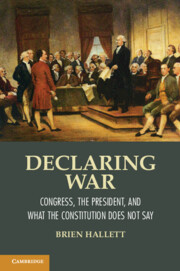Book contents
- Frontmatter
- Contents
- List of Figures
- Acknowledgments
- Prologue
- Miscellaneous Frontmatter
- 1 A Constitutional Tyranny and Presidential Dictatorship
- Part I What Is the History?
- 2 How the President Declares War
- 3 Why the Congress Ought Not Declare War
- 4 A Plan for Acquiescence
- Part II What Is a Declaration of War?
- Part III What Are the Solutions?
- Part IV What Is the Theory?
- Appendix I Five Congressional Declarations of War and One Appropriations Act
- Appendix II The Fœderative Powers in Parliamentary Governments
- References
- Index
4 - A Plan for Acquiescence
The War Powers Resolution of 1973
Published online by Cambridge University Press: 05 November 2012
- Frontmatter
- Contents
- List of Figures
- Acknowledgments
- Prologue
- Miscellaneous Frontmatter
- 1 A Constitutional Tyranny and Presidential Dictatorship
- Part I What Is the History?
- 2 How the President Declares War
- 3 Why the Congress Ought Not Declare War
- 4 A Plan for Acquiescence
- Part II What Is a Declaration of War?
- Part III What Are the Solutions?
- Part IV What Is the Theory?
- Appendix I Five Congressional Declarations of War and One Appropriations Act
- Appendix II The Fœderative Powers in Parliamentary Governments
- References
- Index
Summary
The Congress shall have power … to declare war, grant letters of marque and reprisal, and make rules concerning captures on land and water.
(article I, section 8, clause 11)Altho’ the power of declaring War belongs to Congress, I do not see that it less falls within the scope of the President’s constitutional duty to recommend such measures as he shall judge necessary and expedient than any other which, being suggested by him, they alone can adopt.
Speaker Henry Clay to Secretary of State James MonroeSunday, 15 March 1812The declarations of 1812 and 1898 are beyond question the two most important declarations in the history of the U.S. Congress. The former established the controlling precedents; the latter navigated to the furthest reaches of congressional autonomy, only to discover that congressional autonomy consisted mainly in playing political games. Unfortunately, concluding that the Congress is exceptionally adept at deferring to the president and seeking partisan electoral advantage does not take one very far. Neither is an insight of any great value. This is true especially in the current dysfunctional state of affairs because presidents enjoy playing games even more than the Congress. When a disinclined Congress and a reluctant public stand between a president and his war, his natural reaction is to ignore the real substance of the conflict, switch to a more public relations friendly rhetoric of diabolism, and seize every opportunistic event that passes his way. Soon, the formula takes effect; opposition and resistance are overcome, and the war begins.
- Type
- Chapter
- Information
- Declaring WarCongress, the President, and What the Constitution Does Not Say, pp. 72 - 88Publisher: Cambridge University PressPrint publication year: 2012



